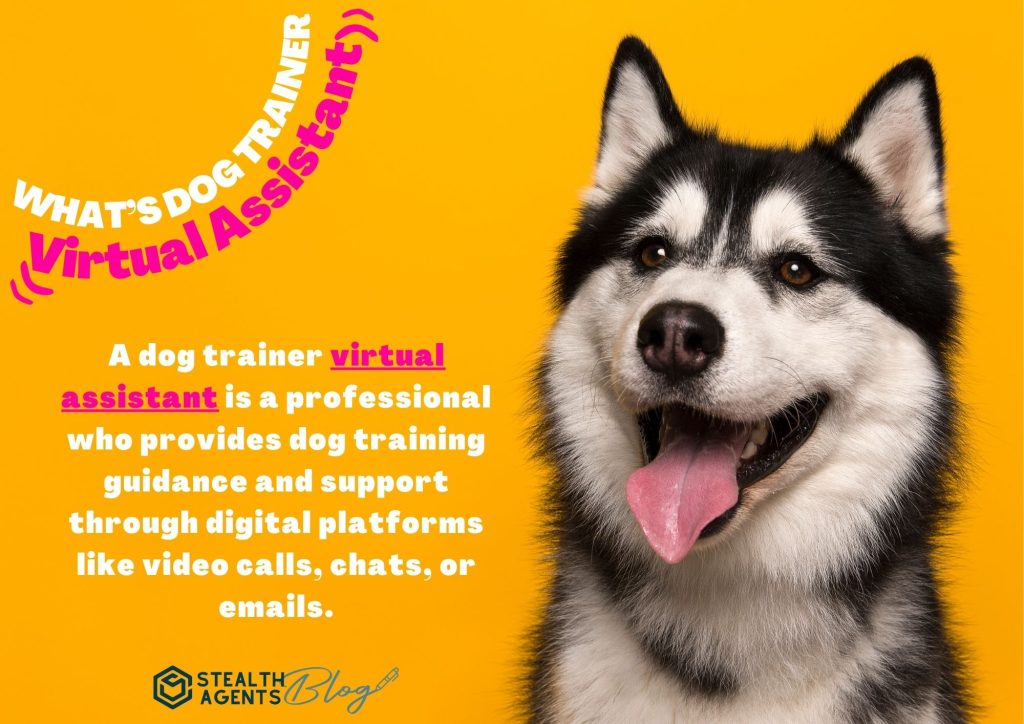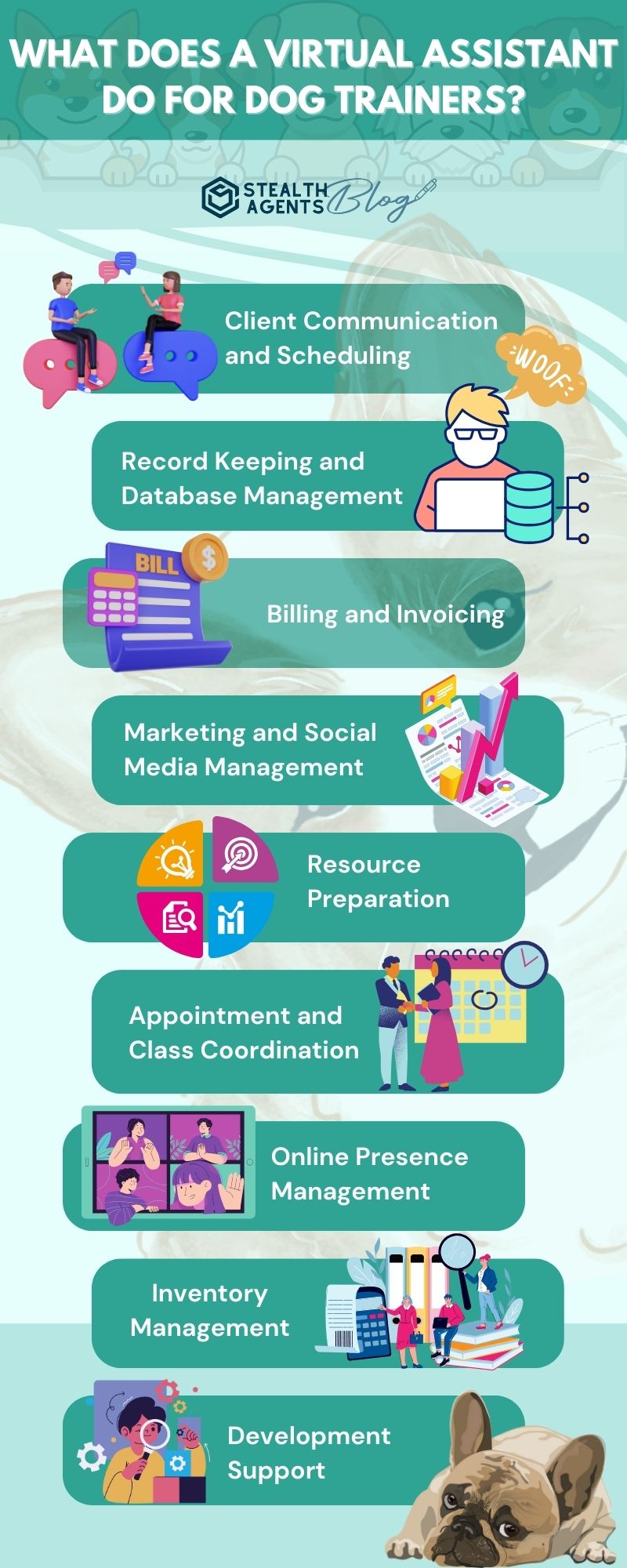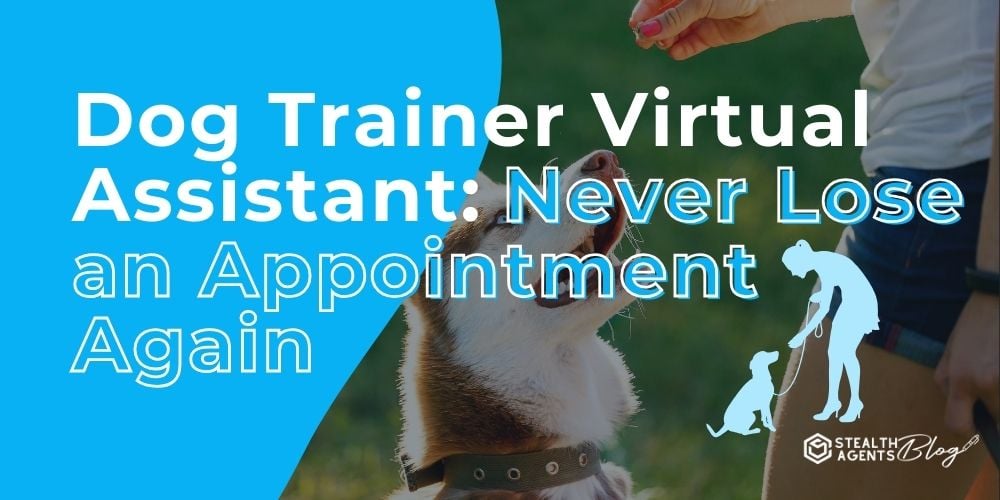Dog trainer virtual assistant services are transforming the landscape for virtual dog trainers and virtual dog behaviorists, offering innovative solutions to enhance productivity and broaden client bases.
With over 85% of small businesses poised to boost their digital strategies, the call for a virtual training assistant is more urgent than ever. This ultimate guide will lead you through an essential strategy for productivity enhancement and strategic decision-making in your training business.
More than 60% of entrepreneurs acknowledge the benefits of offloading repetitive tasks, so employing a virtual assistant for dog trainers can revolutionize your workflow. Stealth Agents, renowned for their expertise in virtual assistant services, provides free consultations to personalize virtual assistant pricing and solutions suited to your needs.
Embrace pet-lover business ideas and empower your enterprise with tailored expertise that aligns with your unique goals.
What’s a Dog Trainer Virtual Assistant?
A Dog Trainer Virtual Assistant is a specialized professional supporting virtual dog trainers and dog behaviorists by handling administrative and operational tasks. These tasks can range from scheduling appointments and managing client communications to crafting social media strategies that help trainers reach new audiences.
With their assistance, trainers can focus more on their core competencies and less on day-to-day logistics. Acting as virtual training assistants, they streamline operations, enhance efficiency, and contribute to the overall growth of the business.
By employing a virtual assistant for dog trainers, companies can ensure that they demonstrate professionalism in all client interactions.
This role not only aids in managing tasks but also in devising strategies to improve digital presence and engagement. A dog trainer virtual assistant is pivotal in transforming trainers’ operations, allowing them to provide better services to their clients.
Trainers can effectively navigate the competitive landscape through their expertise while staying ahead with innovative solutions.

What are the Duties of a Dog Trainer Virtual Assistant?
1. Client Communication and Scheduling
A virtual assistant for dog trainers is instrumental in streamlining client communication by managing emails and phone calls and scheduling appointments, allowing trainers to focus on their core tasks.
They ensure the calendar is regularly updated, preventing overbooking and effectively balancing the trainer’s workload. This role is essential for virtual dog trainers who aim to maintain organized and efficient schedules. The virtual dog behaviorist can also enhance client satisfaction and retention by confirming sessions with clientele.
The virtual training assistant’s attention to detail in communication ensures that no client is missed and that all appointments are timely.
This level of organization allows dog trainers to dedicate more time to developing effective training programs for each dog. Ultimately, their role supports trainers in delivering exceptional service and achieving training success.
2. Record Keeping and Database Management
A virtual assistant for dog trainers plays a crucial role in maintaining meticulous record-keeping and database management, which includes orderly storage of client records, training progress, schedules, and behavioral notes.
This organized approach is vital for virtual dog trainers to track each dog’s milestones and evaluate the effectiveness of training methods. The virtual dog behaviorist ensures the database is up-to-date, promoting efficient and effective client management.
By managing these records, the virtual training assistant helps trainers focus on delivering personalized training sessions.
This support is essential for a virtual assistant for dog trainers, ensuring they have immediate access to vital information. Their efforts significantly enhance trainers’ and furry clients’ overall training experience. Consequently, trainers can concentrate on refining their techniques and achieving successful outcomes.
3. Billing and Invoicing
Managing billing and invoicing is a key task for a virtual assistant for dog trainers. This ensures that businesses run smoothly and receive timely payments.
This involves sending accurate invoices for training sessions, tracking payments, and following up on outstanding bills. Having a reliable virtual training assistant handle these financial details allows virtual dog trainers to focus on training dogs.
The virtual assistant is adept at maintaining accurate financial records, which is crucial for business sustainability. The virtual dog behaviorist enhances client trust and business credibility by ensuring prompt and correct billing.
This support frees trainers from administrative burdens, allowing them to dedicate more time to their primary role. As a result, trainers can deliver high-quality training services without financial distractions.
4. Marketing and Social Media Management
Engaging in marketing and social media management is an integral responsibility of a virtual assistant who creates captivating content for social media platforms to expand the trainer’s audience.
This endeavor attracts and retains clients by informing them about new services, success stories, and tips. Virtual dog trainers benefit from the virtual assistant for dog trainers, who manage digital advertising efforts and track campaign performance.
The virtual dog behaviorist enhances the brand’s online visibility and strengthens community ties by fostering online communities and responding to comments.
The virtual training assistant ensures that marketing initiatives align with the trainer’s goals and audience needs. These efforts showcase the trainer’s expertise, drawing in new clients and bolstering the business’s reputation.
Consequently, trainers can focus on honing their skills while their online presence flourishes.
5. Resource Preparation
As a virtual assistant for dog trainers, resource preparation involves organizing digital assets like training videos, e-books, and schedules to ensure a smooth training experience.
This also includes preparing training modules and custom plans for individual dogs, which is crucial for virtual dog trainers seeking to offer tailored services. The virtual dog behaviorist manages client communications regarding their pet’s progress, providing essential insights into training effectiveness.
By maintaining a well-organized repository of resources, the virtual training assistant facilitates easy access to materials, enhancing training efficiency.
Their support ensures trainers deliver personalized and practical training sessions without administrative interruptions. The virtual assistant’s efforts in resource preparation contribute to a seamless and professional training environment.
As a result, trainers can focus on their expertise while clients enjoy a well-structured training journey.
6. Appointment and Class Coordination
A virtual assistant for dog trainers expertly handles appointment and class coordination. The assistant manages the scheduling of individual training sessions, group classes, and follow-up meetings.
This task is crucial for virtual dog trainers, as it ensures appointments are convenient for both trainers and clients. The virtual dog behaviorist sends reminders to prevent no-shows, maintaining a smooth and efficient training schedule.
By effectively coordinating appointments, the virtual training assistant reflects professionalism and maximizes productivity.
This role is vital for maintaining client satisfaction and ensuring trainers can focus on their primary duties. The virtual assistant’s meticulous attention to scheduling helps prevent conflicts and overbookings. Ultimately, their support enhances the overall efficiency and reputation of the training services.
7. Online Presence Management
Managing an online presence is a pivotal role for a virtual assistant for dog trainers. The virtual assistant creates and oversees social media profiles, ensuring they are up-to-date and informative.
For virtual dog trainers, a well-curated online presence showcases expertise, shares success stories, and promotes services. The virtual dog behaviorist builds a supportive network for clients and potential customers by engaging with online communities.
The virtual training assistant expertly schedules posts and tracks engagement, enhancing the trainer’s digital footprint.
This management is essential for maintaining a dynamic and interactive online presence that attracts new clients. The virtual assistant’s efforts in online presence management ensure that trainers can focus on their core competencies.
Consequently, the trainer’s brand continues to grow and thrive in the digital landscape.
8. Inventory Management
Inventory management is a crucial responsibility for a virtual assistant. It involves monitoring and managing training supplies and products.
This includes tracking the usage of items such as treats, leashes, collars, and training aids, ensuring stock levels are maintained. For virtual dog trainers, having a virtual assistant for dog trainers to handle inventory is crucial for uninterrupted training sessions.
The virtual dog behaviorist diligently places orders before supplies run low and finds cost-effective options. Their meticulous attention to inventory management supports trainers in maintaining consistent service quality.
The virtual training assistant’s role ensures that essential supplies are always available, preventing any disruption in training activities. Ultimately, their efforts contribute to a seamless and efficient operational workflow for trainers.
9. Development Support
Development support, research of new training techniques, and staying informed about industry trends are essential duties of a virtual assistant for dog trainers.
This role is crucial for virtual dog trainers seeking to offer cutting-edge training to their clients. The virtual dog behaviorist compiles educational resources and organizes professional development workshops or webinars. By staying updated, the virtual training assistant ensures trainers can deliver the best possible training services.
Their efforts in development support help trainers enhance their skills and adapt to evolving industry standards.
A virtual assistant for dog trainers’ involvement in professional growth initiatives supports continuous improvement in training quality. Consequently, trainers are empowered to offer their clients innovative and effective training solutions.

Best Dog Trainer Virtual Assistants
1. Stealth Agents

Stealth Agents provides top-notch virtual assistance for dog training businesses, ensuring your operations run smoothly and efficiently. Their team comprises professionals experienced in pet care and training, making them a reliable choice for your needs.
By leveraging their expertise, your business can benefit from streamlined communication, meticulous record-keeping, and effective marketing strategies.
Clients consistently praise Stealth Agents for their dedication to customer satisfaction as they tailor their services to meet the unique needs of each trainer. With their support, trainers can focus more on delivering exceptional training experiences while administrative tasks are expertly handled.
Book a free consultation to discuss your VA preference and pricing information and discover how Stealth Agents can elevate your dog training business to new heights.
2. VA Staffer

VA Staffer offers virtual assistant services that include expert support for dog trainers. Their team helps with marketing, customer support, and other tasks to grow your dog training business.
3. MyOutDesk

MyOutDesk is known for providing highly skilled virtual assistants for various industries, including those specializing in pet services and dog training.
4. Uassist. ME

Uassist.ME has earned its reputation by providing well-trained virtual assistants to handle the diverse needs of dog training professionals, ensuring efficiency and client satisfaction.
How to Hire a Dog Trainer Virtual Assistant?
When hiring a dog trainer assistant, identify your specific needs, such as scheduling appointments, client communication, or assisting with virtual dog training sessions.
Seek individuals with extensive administrative tasks experience and a genuine passion for working with animals. These qualities are crucial in ensuring effective management and a compassionate approach to animal care, making them ideal candidates.
It’s crucial to seek out organized, tech-savvy individuals with a fundamental understanding of dog behavior and training techniques.
Subsequently, thorough interviews become essential to evaluating candidates’ interpersonal skills, ensuring they can effectively communicate and collaborate within the team. This process also assesses their alignment with the company’s core values and culture, guaranteeing they are a harmonious fit for the organization.
Lastly, ensure they are comfortable with the technology tools and platforms you use to deliver your services.
Is Virtual Dog Training Worth It?
Virtual dog training is gaining popularity due to its convenience and accessibility. It allows pet owners to access expert guidance from their homes.
It is particularly beneficial for those with busy schedules or who live in remote areas without easy access to professional trainers. Virtual training can be significantly practical, often involving live, interactive sessions that offer personalized feedback and tailored training methods.
However, one potential challenge is the lack of hands-on assistance, which might be necessary for addressing specific behavioral issues.
Despite this, virtual dog training can be an excellent option for basic obedience training and addressing common behavioral problems. Its value lies in consistently continuing training routines without geographical or time constraints.
Overall, while not a complete substitute for in-person training, virtual dog training provides many dog owners with a flexible and effective solution.
Takeaways
Navigating the world of dog training can be a rewarding yet demanding journey. A dog trainer virtual assistant emerges as an invaluable ally, streamlining daily tasks and maximizing productivity.
With the right expertise, virtual assistants handle everything from scheduling appointments to managing client communications, allowing trainers to focus on what they do best—training dogs. Integrating a virtual assistant into your practice enhances efficiency and fosters a more personalized client experience.
Embracing this digital support can lead to significant growth in your business by expanding your reach and improving service quality.
As the demands of modern dog training evolve, so does the need for innovative solutions like a dog trainer virtual assistant. By leveraging these services, trainers can keep pace with industry trends and maintain a competitive edge.
To unlock the full potential of your dog training business, consider the exceptional virtual assistant services offered by Stealth Agents.













